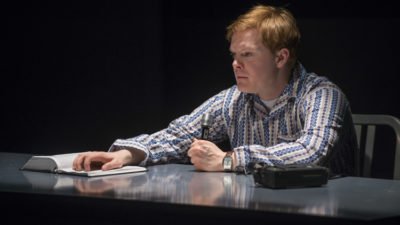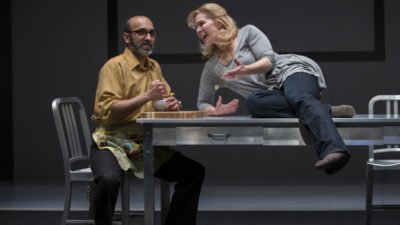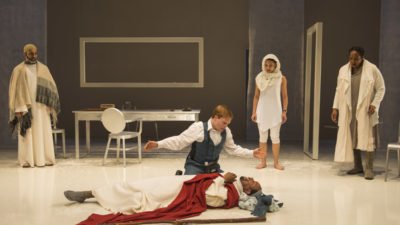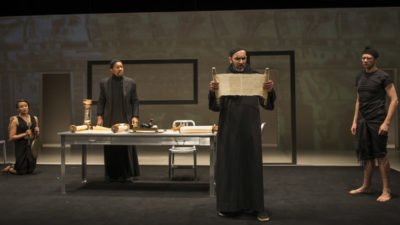The Good Book
By Denis O’Hare and Lisa Peterson
Directed by Lisa Peterson
Produced by Court Theatre
Story of the Bible Makes Strong Production, Needs Revisions
Court Theatre’s world premiere production of The Good Book is a musically transfixing examination of the Bible’s history and impact on present day Americans, but naturally will need some revisions before its next production. The format of the play, in which the stories of a teenage boy in the 1970s, a present-day professor, and the development of the Biblical texts, has many fine scenes that work separately but lack cohesion. However, the cast deftly moves through many different forms and characters, and the design is beautiful. I should state upfront that the subject is difficult for me to personalize, but I heard many other people at the performance I attended say “this is a wonderful play,” and if studying the Bible interests you, your response will probably be similar.
Miriam (Hollis Resnik) is a professor of Biblical studies, and she starts the play by greeting us as her 101 class. She condescendingly, passive-aggressively, and obnoxiously assumes her students are unaware that the Bible is an anthology of a thousand years’ worth of texts which ancient religious leaders debated over whether to privilege above other documents, or that the early part is mythology. And she’s right; her students are morons. She says half of them were home-schooled and never had a teacher before her, and are ignorant in ways she can’t even predict. Her husband, Qasim (Kareem Bandealy) points out she shouldn’t be surprised to encounter Christians in a course on the Bible, but I was distracted by wondering what kind of department head thought she was suited for this class, and what kind of institution she teaches at to have such low quality students. Though Miriam left the Lutheranism of her childhood long ago, Qasim is a Christian, and often separate from her while he conducts archaeological digs in his homeland Jordan. Their relationship is deteriorating as his faith grows.
In the 1970s, Connor (Alex Weisman) is a fifteen-year-old who dreams of becoming a Roman Catholic priest. Actually, he prefers the King James Bible, but is being raised a Catholic, is proud of his service as an altar boy, and adores the fancy vestments and artwork of saints. His parents are creeped out by his fanaticism and practicing exorcisms on the toilet, but that’s because they just don’t understand that fifteen-year-olds know what they want, in his opinion. Conner is also starting to feel sexual attraction to other boys, which becomes a problem after he gets caught in an intimate moment that was uncomfortable to begin with. King James (Erik Hellman) visits him in visions to provide advice, but that just results in more awkward sexual tension.
Interspersed with Miriam and Connor’s stories are scenes from Hebrew history with the other five actors playing ancient people. We see post Bronze-age collapse migrants to Israel committing the names of their ancestors to memory, the loss of early Jewish scriptures following the fall of the northern kingdom, a prophet during the Babylonian captivity, and so forth. These scenes are presented in a wide variety of ways, the one with the prophet receiving a supernatural presentation from Mark Bennett’s sound and Mike Tutaj’s projections, while the rest are played realistically. Rackel Hauck’s set design—simple, modernist, and abstract—is flexible enough for any location, while costume designer Linda Roethke clearly delineates cultural conflict by dressing the traditional Hebrews in black and the Hellenized Judeans in white. Simple, but a striking image.
In the second act, Miriam and Connor are in crises, and go through a series of hallucinations or visions involving the other actors as people from their lives, the Bible’s development, and vaguer, less human entities. There are lots of good scenes here: an interview with Paul of Tarsus, a nineteenth century tent revival. Bennet’s music is a high point of the show, and a scene of Scottish monks in the early middle ages singing about drawing on their manuscripts is lovely in its tranquility. However, most of these scenes end abruptly, and the lack of reference to them after they finish makes them seem more like random occurrences than a journey for our protagonists. Bandealy, Hellman, Emjoy Gavino, Allen Gilmore, and Jacqueline Williams each have several memorable roles from all corners of political opinions and experiences; for example, Gavino plays both one of Miriam’s fundamentalist students and a feminist Bible revisionist. But it’s their musicality I remember most.
Peterson’s directing keeps the multiple story threads clear in the first act with some help from supertitles, and keeps eliciting strong performances from her actors throughout the second. Miriam struggles with a sense of loss that is stereotypical of first generation atheists, but Resnik is absolutely convincing through private moments of fear and doubt, public defiance, and anti-realist action and metaphysical sequences. Weisman’s character had to be set in a different time to be plausible, and his epiphany is obvious from a modern standpoint, but Weisman plays him with appropriate defensive earnestness which gradually breaks down. It will be difficult for Peterson and O’Hare to decide what to cut in future productions, and perhaps the show’s length is meant to contribute to its epic scope. As it is, however, while most people who are interested in this subject will enjoy the production and may find something new to think about or remember something old, it is not an epic until the various elements are more closely tied together and to broader society. But it’s a good first showing.
Recommended
Jacob Davis
Reviewed March 29, 2015
This show has been Jeff recommended
For more information, see The Good Book’s page on Theatre in Chicago.
Playing at Court Theatre, 5535 S Elllis Ave, Chicago. Tickets are $45-65; to order, call 773-753-4472 or visit www.CourtTheatre.org. Plays Wednesdays and Thursdays at 7:30 pm, Fridays at 8:00 pm, Saturdays at 3:00 pm and 8:00 pm, and Sundays at 2:30 pm and 7:30 pm through April 19. Running time is three hours with one intermission.




